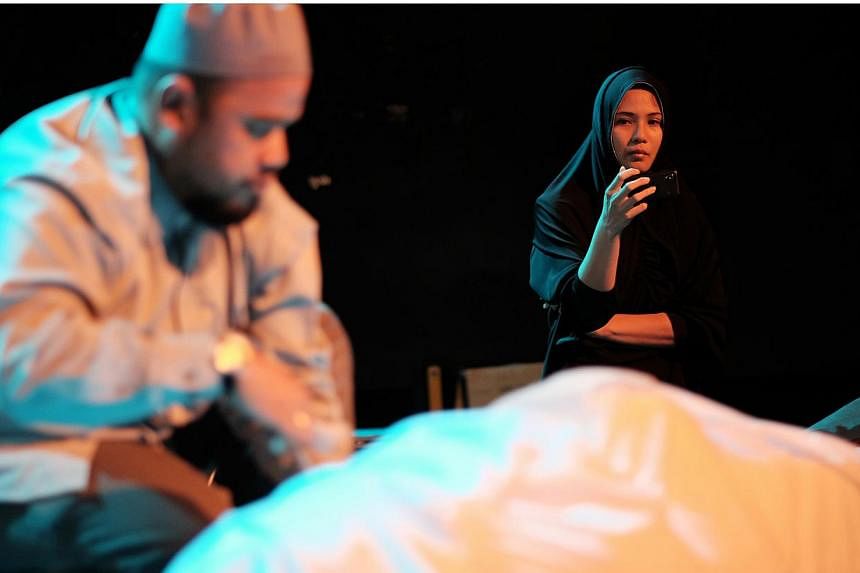In Hawa, playwright Johnny Jon Jon asks some very tough questions about Islam, holding a mirror to society as he navigates an issue rarely heard in a religious context - that of homosexuality.
Presented by Hatch Theatrics, the story unfolds during a funeral held by recent convert Siti (Isabella Chiam), for her "close friend", later revealed to be her lover, Sarah.
Only two people attend the funeral - the practical proprietor of Zoom Zoom Funeral Services, Ahmad (Saiful Amri), and a religious romeo hoping to score a date, Zaki (Al-Matin Yatim).
To the men's bewilderment, Siti has not called any relatives, and refuses to bathe the body, a crucial part of Muslim funeral rites. Being the only woman there, she is the only one amongst them who can do so.
In Chiam, we believe that her Siti is carrying a great emotional burden that she cannot shake off - a niggling feeling that their forbidden love has caused Sarah to fall sick in the first place.
We feel for her confusion as she meanders the waters of her new religion, which seems to have no room for her version of love.
"Why should you stay in a religion that persecutes you?" she asks, baffled. But she does not get any easy answers.
In Hawa (which both refers to the Quranic Eve and the female gender), we see a type of Muslim woman rarely shown onstage - one who rebels.
She removes her headscarf and decries it as a piece of cloth, she attempts to seduce Zaki, she swears and she smokes. But in the end, she still turns to the religion for comfort.
What is also interesting is how Zaki and Ahmad, despite being more learned in the way of the Quran compared to Siti, are extremely flawed themselves.
In particular, Zaki's hobby of going to strangers' funerals to comfort "our veiled sisters", as he calls them, and then moralising it as serving a duty to God, is preposterous. Yet, by praying for the deceased, he is ultimately doing a good deed.
In large part, Hawa works as a black comedy and Jon Jon has a knack for witty dialogue.
For example, when the money-minded Ahmad offers to bring more people to the funeral, for a fee, Siti questions the sincerity of these people if they have to be paid.
"Their sincerity is in their blessings," he says, drawing titters from the audience in the packed theatre of The Substation on Friday.
The actors turn in commendable performances. I was particularly impressed with how young actor Al-Matin managed to endear lothario Zaki to the audience.
Faizal Abdullah's direction was simple yet effective, using a bare bones stage with a physical (and sometimes symbolic) veil separating certain characters.
A standout scene in the play was when Ahmad demonstrates how to bathe a dead body.
He takes his time to wrap the body in the "kain kafan" or white cotton shroud used for burial, and with the air sweetened with perfumed water, the scene felt very real. There were definitely some sobs from people around me.
Where the play worked less effectively was in the unnecessary scene transitions, which were marked by lyrical statements read by a female voiceover, with chapter headings such as The Devil, The Lovers and The Towers. After a while, these became tiresome.
Despite these flaws, Hawa still manages to shine. Perhaps, like what Zaki says to Siti, it is ultimately about knowing one's intentions, and being true to them.
In the end, Siti makes a final phone call that one presumes is to Sarah's parents - one step towards finding her own salvation. Like Hawa, she may be imperfect, but redemption may not be that far away.
The show is sold out.


